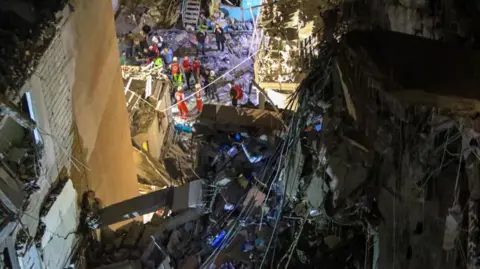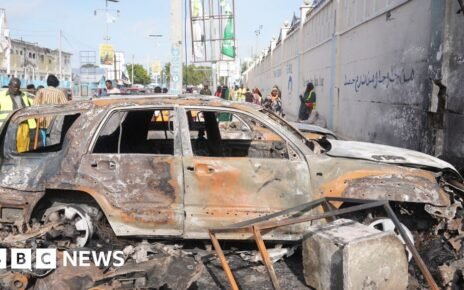Israel says it has killed a top Hezbollah commander after carrying out a strike on a southern suburb of the Lebanese capital Beirut.
At least one person was killed and a number of others wounded in the explosion in Dahiyeh, a stronghold of the Lebanese armed group.
The Israeli military says Fuad Shukr was the target of an “intelligence-based elimination” by fighter jets.
Officials say he was responsible for a rocket attack on the Israeli-occupied Golan Heights on Saturday which killed 12 people, mostly children. Hezbollah has denied any involvement in that attack.
Lebanon’s Prime Minister Najib Mikati condemned “blatant Israeli aggression”.
He described it as a “criminal act” in a “series of aggressive operations killing civilians in clear and explicit violation of international law.”
In a brief post on social media after the attack, Israeli Defence Minister Yoav Gallant said: “Hezbollah crossed the red line”.
It is not yet clear if Fuad Shukr was killed in the attack. Security sources in Beirut say the intended target was not in the building. Hezbollah has not yet made a statement.
An Israeli official has confirmed to CBS News, the BBC’s US partner, that Israel gave the US notice of its Beirut strike.
Fuad Shukr is a believed to be a senior advisor to Hezbollah leader Hassan Nasrallah, the US has previously said.
It has been offering a $5m (3.9m) reward for information about him, alleging he also played a “central role” in the 1983 bombing of a US Marines barracks in Beirut, which killed 241 US military personnel.
Haret Hreik, the area of Dahiyeh hit by the air strike, is densely populated and strongly fortified. Dahiyeh itself is surrounded by Hezbollah checkpoints.
Speaking after the Israeli strike, White House press secretary Karine Jean-Pierre told reporters that US President Joe Biden believed a wider war between Israel and Hezbollah could be avopided.
“We do not want to see an escalation, we do not want to see an all-out war,” she said.
Earlier in the day, two unnamed Israeli officials told Reuters news agency that while Israel sought to hurt Hezbollah, it did not want to drag Lebanon into all-out war.
The Israeli Defense Forces (IDF) later said there would be no new instructions for Israelis on taking shelter, suggesting they did not anticipate an immediate or significant Hezbollah reaction.
Both sides are aware of the cost of all-out war, which could bring in Iran in support of its Lebanese proxy.
 AFP
AFPAn Israeli reaction had been widely expected after the deadly attack in the Israeli-occupied Golan Heights on Saturday, and Israel’s security cabinet had authorised Mr Netanyahu and Mr Gallant to decide how to retaliate.
At least 12 people were killed – mostly children – when a rocket hit a football pitch in Majdal Shams on Saturday.
Israel has blamed Hezbollah, but the group denies any involvement.
It was the deadliest incident near the Israel-Lebanon border since hostilities between Israel and Hezbollah escalated in October.
That escalation came after Hamas’ attack on Israel on 7 October.
Hezbollah – which supports Hamas – opened up a limited second front in Israel’s north, and the two sides have been exchanging fire ever since.
Recent days have seen world leaders urge restraint over fears of an all-out war.
On Tuesday the UK foreign secretary told UK nationals in Lebanon to leave immediately or risk “becoming trapped in a warzone”.
David Lammy has arrived in Qatar along with Defence Secretary John Healey “to “drive forward efforts to bring the conflict in Gaza to an end and to press for de-escalation in the region”, the Foreign Office said.
He said escalation and destabilisation were “in no-one’s interests”, adding: “It is absolutely vital that we engage closely with partners like Qatar, who play a key role in mediating the conflict in Gaza, so that we can bring this devastating war to an end.”




